MercoPress. South Atlantic News Agency
Tag: Artic
-
Friday, May 24th 2013 - 06:35 UTC
Russia forced to evacuate Arctic base because of melting ice field
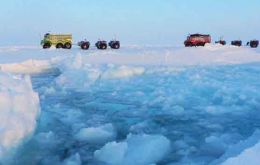
A Russian drifting Arctic research station is to be evacuated because the ice field around it is melting, the environment ministry in Moscow reports. The evacuation order plan to be drawn up within three days for North Pole 40 and its staff of 16 is already operational.
-
Monday, May 6th 2013 - 21:24 UTC
Arctic seas acidity from CO2 emissions advancing faster than forecasted

The Arctic seas are being made rapidly more acidic by carbon-dioxide emissions, according to a new report. Scientists from the Arctic Monitoring and Assessment Program (AMAP) monitored widespread changes in ocean chemistry in the region.
-
Thursday, April 4th 2013 - 02:06 UTC
Expanding Antarctic sea-ice triggers different scientific explanations

Climate change is expanding Antarctica's sea ice, according to a scientific study in the journal Nature Geoscience. The paradoxical phenomenon is thought to be caused by relatively cold plumes of fresh water derived from melting beneath the Antarctic ice shelves.
-
Thursday, February 28th 2013 - 01:27 UTC
Shell suspends offshore drilling program in the Arctic for the rest of 2013
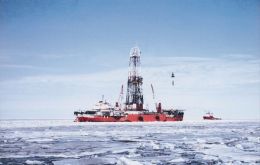
Royal Dutch Shell has said that it will suspend its offshore drilling program in the Arctic for the rest of 2013 in order to give time to ensure safety. The decision to pause drilling for oil in the Chukchi and Beaufort Seas off Alaska was widely expected, following a catalogue of problems last year.
-
Tuesday, August 28th 2012 - 04:58 UTC
Rapidly eroding ice cap and thickness makes the Arctic even more vulnerable
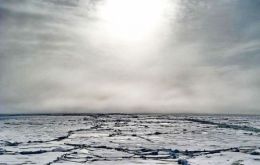
Arctic has lost more sea ice this year than at any time since satellite records began in 1979, Nasa says. Scientists involved in the calculations say it is part of a fundamental change. What is more, sea ice normally reaches its low point in September so it is thought likely that this year's melt will continue to grow.
-
Thursday, August 16th 2012 - 19:37 UTC
Ship linked to Captain Scott’s failed South Pole expedition found off Greenland

The wreck of the ship that carried Captain Robert Scott on his doomed expedition to the Antarctic a century ago has been discovered off Greenland. The SS Terra Nova was found by a team from a US research company.
-
Monday, June 11th 2012 - 19:23 UTC
Extended blooming phytoplankton discovered under thinning Arctic ice cap

Scientists have made a biological discovery in Arctic Ocean waters as dramatic and unexpected as finding a rainforest in the middle of a desert. A NASA-sponsored expedition punched through three-foot thick sea ice to find waters richer in microscopic marine plants, essential to all sea life, than any other ocean region on Earth.
-
Wednesday, February 22nd 2012 - 20:39 UTC
British subs to provide under-the-ice data to help with Arctic climate change

Data collected by Royal Navy vessels, as part of standard operations, is set to provide clues on Arctic climate change. Little is known about the areas of water underneath the Arctic ice, as sensors are difficult to place for long term deployment. Now UK environmental researchers are to be presented with previously unavailable information provided by the UK Ministry of Defence (MOD).
-
Monday, October 3rd 2011 - 07:14 UTC
“Ozone hole” over the Arctic claims NASA; blames long spell of cold weather
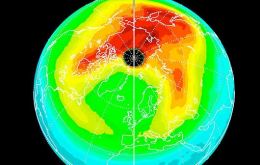
Ozone loss over the Arctic this year was so severe that for the first time it could be called an “ozone hole” like the Antarctic one, scientists report. About 20km above the ground, 80% of the ozone was lost, they say.
-
Thursday, September 22nd 2011 - 11:24 UTC
Bowhead whales from Greenland and Alaska mingle along the Arctic passage
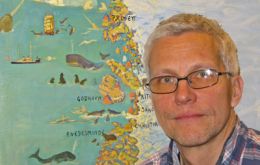
Bowhead whales, the giants of the Arctic, are using the Northwest Passage to move across the top of the Americas. Skeletons, DNA samples and harpoon heads have all suggested that bowhead populations living on each side of the continent did meet and mingle.
